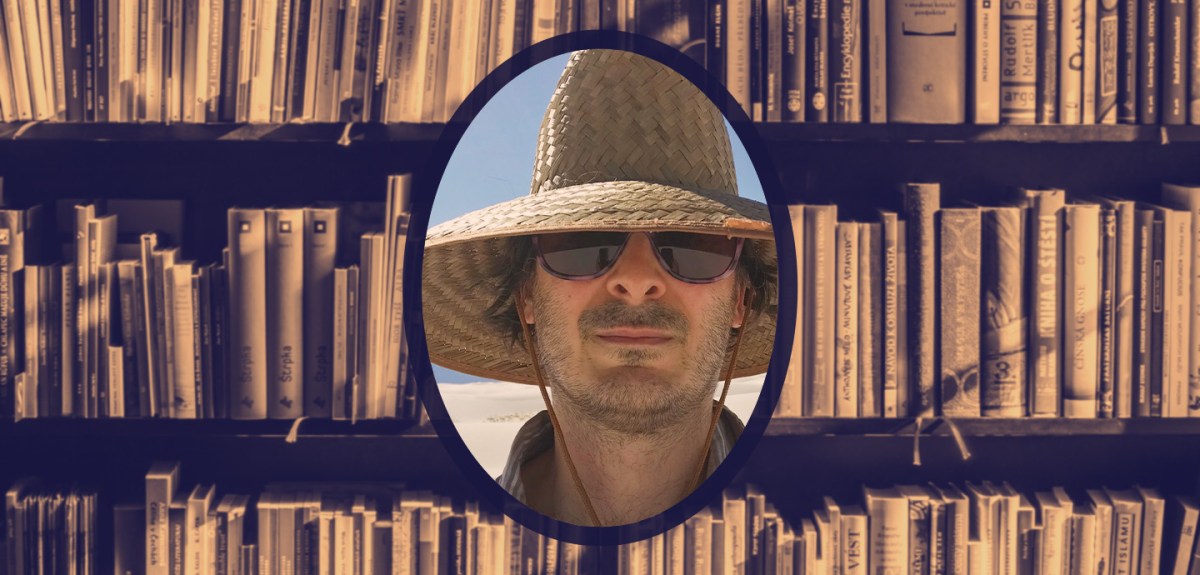[ad_1]
“The Artist’s Bookshelf” is a column about books that inspire the CHIRB staff’s favorite artists.
Chicago indie powerhouse Tim Kinsella has eclectic taste to match his eclectic artistic output. On top of the musical acts for which he is most known, including Joan of Arc and Owls, he is also the author of three novels, most recently Sunshine on an Open Tomb, of which publisher Featherproof writes, “Lean in, readers of Richard Brautigan. Over here, fans of Robert Anton Wilson. This book is for you, anyone who’s ever looked at the moon.” His current musical project is in collaboration with his wife, Jenny Pulse, and is called Good F*ck; they have been releasing music on a nearly monthly basis on bandcamp since early last year of a peak Kinsella variety: inventive, inquisitive, playful, delightful, and a little unnerving.
I’ve always wanted to know more, because I am in awe but also confused, and so saw our Artist’s Bookshelf feature as a perfect chance to understand Kinsella a bit more through his own words. Below are five of Kinsella’s favorite books and what he had to write about them.

Five thousand books cram our apartment and somehow these five appeared to me with total clarity immediately upon receiving this invitation. I had no idea these would be the books if anyone asked. But they make sense.
Technically, like according to my taxes, I’m a musician that collaborates across mediums. But fundamentally, like according to my brain and heart and hands, I’m a poet and collagist. I’ve never presented a poem or collage to the world. But those are the building blocks to think through what I do.
To be a contemporary musician—at least in the common way that I approach it—mostly means you play Production itself. To play a specific instrument nowadays is akin to stretching taffy at a beach-town boardwalk or jousting at The Renaissance Fair: a quaint fantasy that technologies aren’t as dominant as they truly are. Contemporary modes of music production require one to think as a poet and collagist.
Years of frequent returns has charged each of these books with my juju, and my daily work and attitudes embody them in shifting ratios. (I present them in no hierarchical order.)

The Conversations: Walter Murch and The Art of Editing Film
By Michael Ondaatje
Legendary film editor Walter Murch is one of those people that knows about everything and focuses this prodigious knowledge sharply into his specialization. Michael Ondaatje asks the right questions. I was fond of both men’s work but never would’ve identified as a fan when I came across this book 15 years ago. But its broad and practical applications make it the ultimate manual to interdisciplinary technique and reasoning.

Free Play: Improvisation in Life and Art
By Stephen Nachmanovitch
Through my late teens I reread Rilke’s Letters to a Young Poet and ee cummings’ i: 6 non-lectures many times. By the time of the Iraq War’s Shock and Awe I was in my late 20s and had already dedicated years to Chomsky, Assata Shakur, and The Situationists. And still I wasn’t steeled to withstand the psychological and emotional devastation I felt enduring the proliferation of inverted logic. So, fried in upside-down world, I tore through all the new age and self-help classics. Free Play: Improvisation in Art and Life by Stephen Nachmanovitch blends those formative missives on creativity with the grounding pop-psych we all occasionally require to face the absurdity of a grocery store magazine rack. I know nothing about this writer. It’s a super-hippy, 70s small press-looking book I picked up for a quarter somewhere. My copy—the third I’ve owned—is held together with a rubber band.

Edited by Jerome Rothenberg
My mother-in-law said it’s OK I don’t attend mass because this book is like my bible. My copy is absurdly dog-eared and marked-up. I do begin a lot of days reading it for an hour, always finding new depths and dimensions. Both imagery and form: I’ve never lifted so much from anything else. A collection of primary sources, it’s a deep and expansive history of how humanity has come to understand itself. Nowhere else have I ever experienced The Erotic and The Sanctified in such proximity, and so profoundly felt the impact of their resolutions.

Edited by John D’Agata
Next may be in the title, but this anthology now feels like a time capsule of the peak potential of the essay before the technological leap to internet dominance, smartphones, and social media changed how we all read. Many of the essays—in the inventiveness of their language, topics, and forms—now seem to foretell this shift. Not as spooky as how Calvino’s final lectures and Richard Powers’s essays on the systems novel now read like premonitions. But this collection presses up to a rupture point that makes the internet feel inevitable.

By David Shields
Speaking of manifestos, yeesh. I think about David Markson every day when I look at Twitter. But I don’t want to crack this list open into fiction because then I’d have to choose between Gary Lutz and Peter Markus, and I love Savage Detectives more than any book since Huck Finn when I was a boy back in the old world and would finish reading it and flip right back to the first page to start it again without pausing. I love Bernhard and Sebald and Maggie Nelson. And Reality Hunger helps me appreciate all of these. It was an inevitable book at the time of its publication, its central conceits drifting in the bardos waiting for someone to snatch them. All the other art forms were already there. And now it’s a historical document to make sense of where we are with what we make.

[ad_2]
Source link
